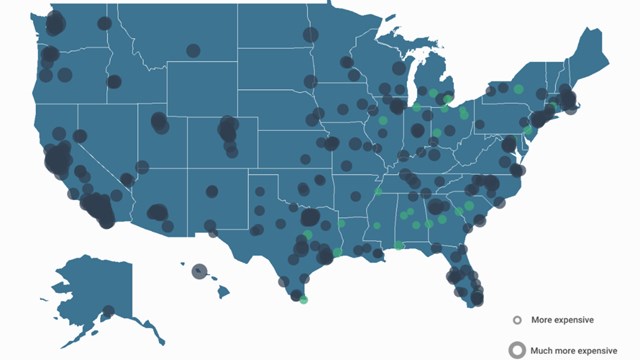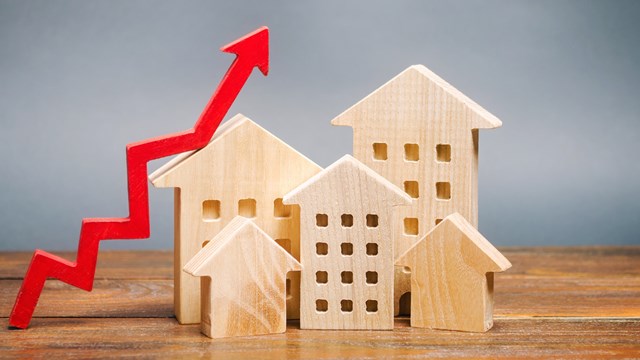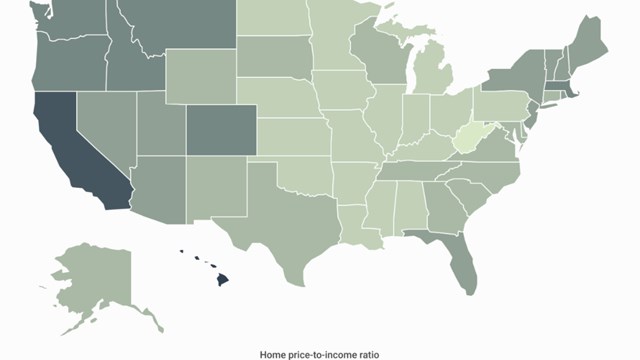New Yorkers are a famously busy bunch, always looking for ways to maximize their time. Buying or selling an apartment can be the most time-consuming process imaginable, and city dwellers are always eager to try out ways of moving things along: Hence the enduring popularity of open houses - one of the most efficient ways of unloading or snapping up real estate. But how do group events stack up against private showings? And what's the best way to run an open house? Are there mistakes to avoid? Read on, and the open house will be an open book.
For sellers and their brokers, open houses are an unbeatable selling tool. They save time, they can help move an apartment faster, and they give brokers a great opportunity to reach lots of clients simultaneously. "An open house helps you cast a wider net," says Susan Wolf, a broker for Stein-Perry Real Estate, Inc. in Manhattan, which specializes in marketing uptown co-ops in the $125,000 - $400,000 range. "You always have clients who are already looking in the area and come to you unsolicited, but an ad for an open house attracts people from all over. It's a great way to reach potential clients who might not otherwise look in your neighborhood. And even if the apartment they came to see isn't right for them, they often ask to see what else you have."
Those spontaneous inquiries often mean more clients for the broker, and more exposure for that broker's sellers. Open houses can even spark competition and help sellers get a better price. "Sometimes you'll get a bidding war," says Pamela D'Arc, a vice president of Stribling & Associates, a firm that handles mid-range to luxury properties starting at around $400,000. In addition, "They're a good way to take the temperature of the market," notes Irwin Cohen of A. Michael Tyler Realty Corp., a Manhattan-based real estate management firm and brokerage house that handles properties ranging from modest to very high end. "You immediately get a feel for whether your asking price is appropriate. And you get to meet everyone in person - which gives you a quick read on whether prospective buyers will pass muster with the board," he says.
Open houses are also convenient for the apartment-hunters. "Buyers really seem to like them," says Wolf. "They feel like they can control the situation, and make their own judgments in an independent way. It's efficient for them because they can often hit several in one day. I think it's almost become a hobby of sorts for a certain segment of the population. People used to go to art galleries on Sunday, but now you get people who like to shop for apartments," she reports. "Clients like the flexibility," adds D'Arc. "They have the freedom to cancel if they decide not to go that day. They can send someone ahead to scout it out and then call others to come see it if they like it. They can spend a longer time in the apartment than in a private showing." All in all, it seems like the way to go - but what about the alternatives?
Although many brokers like to do open houses whenever possible, there are situations in which an open house isn't the best approach. Not everyone enjoys asking questions while half a dozen other potential buyers are simultaneously sniffing around like a pack of barefoot women at a shoe sale. "High-end buyers often want more personalized service," says Cohen, "And there just aren't as many people shopping for a two-million-dollar apartment."
Consequently, most brokers don't hold open houses for properties costing over $1 million. D'Arc says she sometimes does open houses "by appointment only" for luxury properties - meaning that she schedules 20-minute private showings back-to-back for the whole two hours. That way she still benefits from the efficiency, but her clients still get the individual attention they want. "It's not that one way is better than the other. They're just two completely different approaches," Wolf explains. "When you're doing private showings, your focus is on helping the buyer. You're thinking: what does the buyer want? For a buyer who wants a lot of help, a private showing might be better. When you're doing an open house, your focus is on selling that particular property, so the emphasis is on helping your seller find the right buyer."
Cohen reports that another option that's becoming popular is the "virtual" presentation. "A lot of buyers are short on time, so brokers are starting to post digital video tours of their properties online," he says. Web-savvy clients can get a head start on their search, and save everyone the trouble of a live appearance if the property isn't right. It's also a good tool to reach a broader audience, including shoppers who aren't already in the area.
Most brokers will advise against trying to hold your own open house, but it has been done. Whether you're hiring a broker or doing it yourself, here are some basics for a running a smooth open house: First, do your homework about market prices. If you're priced too high, you'll just spend longer trying to sell. Second, place an ad in The New York Times, which is the main place that buyers look. But don't hesitate to advertise on the Web, which is becoming a more and more popular way to shop. Third, make sure to pick a good time slot. According to Wolf, Sunday afternoons seem to be the traditional time, but anytime during the weekend should work.
"I sometimes do weekday evenings in the winter - usually from 7:00-9:00 on a Wednesday or Thursday evening," says Cohen. "But never hold an open house on a weekday during the summer because everyone's away on vacation. It's also important to pick a time of day when the light is at its best, especially if you have a view or rooftop garden."
According to Mary Anne Greene, a broker with Insignia Douglas Elliman in Manhattan, "It's best to hold open houses on weekends so people can work them into their leisure schedules."
Next, a no-brainer: give the place a Martha Stewart-caliber once-over. Make sure it's squeaky clean. If it's still occupied, tidy up anything that might make the space look smaller, clean out closets, and stash away valuables. D'Arc even recommends having an extra person on hand to serve as security, especially if there's a lot of valuable art in the apartment, for example. And finally, remember to have a sign-up sheet so you can keep track of everyone - and expect interested parties to request multiple visits.
A final word of caution to sellers: Remember that painful scene in the film American Beauty where Annette Benning's character holds an open house and nobody comes? A dismal situation to be sure, but the opposite can be just as harrowing. Too many people - or, more pointedly, the wrong people - can spell disaster.
"You want quality, not quantity," says Wolf. "A broker in my firm once held an open house in a lovely Art Deco building in Washington Heights. The seller got a little overzealous, and papered the entire neighborhood with signs. Unfortunately, the building had a lot of elderly residents with rent-controlled apartments. On the day of the open house, these tenants came shuffling into [the apartment] in their bathrobes and bedroom slippers - swarms and swarms of them, complaining about how the neighborhood was getting too fancy, bragging about their Depression-era rents, until the whole apartment was engulfed in a sea of chaos. None of these people were shopping for an apartment; but they scared away anyone who was."
Even worse than cranky tenants, are out-and-out thieves. It's possible that someone might infiltrate your open house and try to steal something using the crowd as cover, or use the open house as a means of slipping into the building to do mischief elsewhere. Although problems like these are extraordinarily rare, it's still prudent to restrict publicity to places legitimate buyers will be looking versus broadcasting the news to the whole world.
And though most brokers agree that the weekend is the choice time to schedule showings, "You're apt to get visitors who are not serious shoppers at weekend open houses," cautions Greene. She also points out that there are ways of telling the poseurs from the purchasers; "I can spot serious shoppers from browsers by their attitudes. Prospective buyers ask pertinent questions about the space - not about the furniture or art that may be in the home." Not every non-buying open house attendee has a nefarious agenda, however. "As long as casual visitors aren't obtrusive, I'm not really bothered by them," says Greene. "One woman I've talked to regularly visits all my open houses - she comes in from New Jersey for a day that includes museum-going."
All in all, it seems that the pros are in agreement that open houses are an extremely useful tool for buyers, sellers, and brokers alike. Nothing beats being able to walk around in a space, look out the windows, test the bathroom taps, and begin picturing where furniture and decorations will go. For brokers, an open house enables more people to view the property, and might even result in competing offers - which could mean more options for the seller. A well-planned, well-executed open house may be just what you need to close the book on your home search. n






Leave a Comment